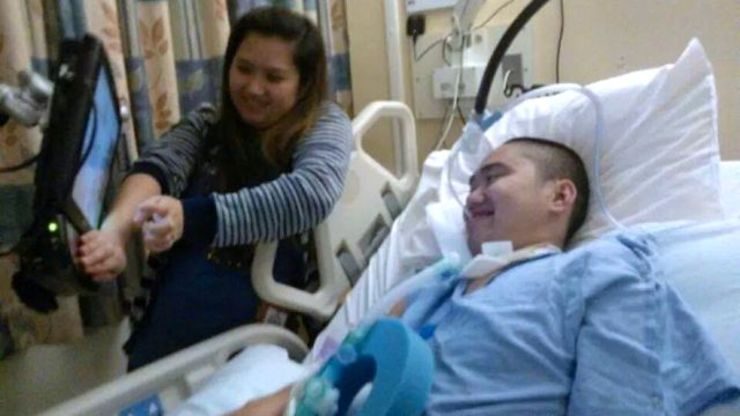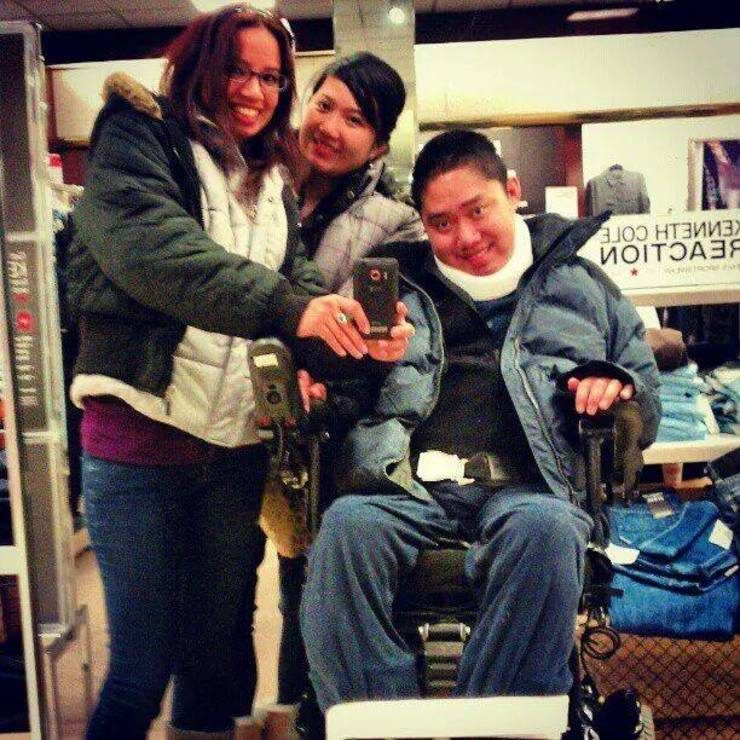SUMMARY
This is AI generated summarization, which may have errors. For context, always refer to the full article.

MANILA, Philippines – Ronnel Bittig had a promising career ahead of him.
Just a few years after he and his family migrated to the United States, Ronnel joined the US Navy, got deployed to Iraq, and looked set to slowly realize his dream of becoming an officer.
It was in Japan when he felt his muscles twitch while he was playing basketball. He shrugged it off. Maybe he had been pushing his body to the limit, he’d been told; his family told him to take it easy for a while.
Before his second deployment, Ronnel took a required medical test. And then a second, and a third, and all of the doctors confirmed the same thing.
Ronnel Bittig was 25 when he was diagnosed with amyotrophic lateral sclerosis or more popularly known as ALS.
The diagnosis
The news came as a shock to his family. His sister, Shai, says the family had no history of ALS, and Ronnel had turned out to be the first in the family.
Shai recalls how she had been in denial over the news, how she had gone to church and questioned God when she learned what would happen to her older brother.
ALS is a progressive neurodegenerative disease that affects nerve cells in the brain and spinal cord, causing motor neurons to degenerate.
Over time, the ability of the brain to initiate and control muscle movement is lost, slowly leading to paralysis.
As many as 30,000 Americans have the disease. There is as yet no cure for it.
The diagnosis should have been hard to accept for a young man in the prime of his life, who loved to play sports and had a bright future ahead of him.
The disease not only stripped him of control over his body, but took away his dreams. Shai says Ronnel had always wanted to have kids.
“He wanted three children,” Shai says. “But the genetic specialist said that it would be hard, because there was a 50% chance that the baby might get the disease.”
But Ronnel did not react the way one usually would in the face of devastating news. Instead, he took it calmly, and resolved not to let the disease take over his life.
“He told us: ‘Why deny it? If there’s nothing we can do, I’d rather take it than be in denial.’”
Shai continues: “I was angry when I learned about the diagnosis, but to see that he was not angry with God…that inspired me.”
Life with ALS
Perhaps one of the most challenging things about seeing a loved one with ALS is being a witness to the slow degenerative process.
Ronnel first experienced lower back pain and muscle twitching before finally losing control over the left side of his body. Then he started to limp, forcing him to use a cane; the disease spread upwards, and he had to use a wheelchair. Eventually, he lost the power of speech.
Today, Ronnel uses his eyes to communicate, using a computer to type out messages.

But through it all, he has not lost the optimism that had surprised his family at the very beginning of his ordeal.
Shai recalls how her brother would still crack jokes even as his condition got worse. She also recounts how Ronnel and his wife decided not to let the disease dictate how they were going to live their lives.
One of the most difficult things the family had to face, Shai says, was being away from Ronnel.
Ronnel and his wife had decided to move away from California and settle in Boston.
“That was really hard for us,” Shai says. “Mahirap na malayo siya sa amin. But he had already made up his mind to leave.”
“He said, ‘I need to do it for myself.’ So we let him leave.”
Love, hope and optimism
The family worked together to make the arrangement work. From San Jose in California, they would visit Ronnel from time to time, making sure he was okay and that his needs were taken care of.
It helped that Ronnel could count on a devoted wife who would tirelessly look after her husband.

Shai remembers how, on one of her trips to Boston, she felt reassured that her brother was in good hands.
“I remember seeing my brother and his wife talking and smiling, like he was not sick, like everything was okay,” she says. “They were singing. Nagkukulitan sila.”
“In spite of his sickness, he is still able to make her happy. He would make jokes out of nowhere just to make her smile.”
Shai knows her brother does this to keep the family’s spirits up. In November, Ronnel will celebrate his birthday; it will also mark the five years since the 2009 diagnosis that changed the course of his life.
Reaching the five-year mark is a cause for celebration, but also of worry: ALS patients typically live about two to five years from the time of diagnosis, and Ronnel’s family is holding on to faith and hope that all will be well. (READ: ALS: The silent, slow killer)
Ronnel’s wife, Shai says, is still optimistic about her husband’s prospect for recovery.
“She’s still hoping that one of these days, babangon si Ronnel, magba-basketball ulit,” Shai says.
“Ako, namimiss ko ang boses niya. Ilang taon ko nang hindi naririnig.”
But she and her family has worked hard not to let pain and fear show.
“We want to show him that we’re strong,” Shai says. “For ALS patients to live longer, they should be surrounded by love and happiness.”
The family plans to throw a huge birthday party for Ronnel in November, a celebration of his journey and the way he has inspired countless people with his positive outlook to life.

Friends’ support
When the ALS ice bucket challenge started going viral on social media, Shai saw it as an opportunity to raise awareness about ALS.
There have been many misconceptions about ALS – such as whether it is contagious – and Shai wanted people to know more about the disease, not to arouse pity but to foster understanding.
The viral craze has also helped pull in more donations for the ALS Association, giving rise to the hope that through the funding of research, a cure may be found soon.
The family’s friends have also done the challenge themselves, and especially dedicated their videos to Ronnel.
Shai shares that their friends have been active in campaign drives to raise money for ALS research, and Ronnel himself has contributed more of his cheeky humor to the occasion.
“He chose the slogan for the T-shirt we used for the ALS walk,” Shai shares.
The slogan he chose? “I will never give up kasi pogi ako!”
Even with the jokes and the laughter, the weight of the disease still hangs on the family’s shoulders. It’s not easy, but Shai says they find strength in Ronnel, who has worked so hard to continue living a life of love and laughter.
“Until now he still makes jokes,” Shai says, explaining how Ronnel would painstakingly spell out messages to his family, letter by letter, using his computer. “He’s trying so hard not to show the pain…Na-iinspire ako sa kanya.” – Rappler.com
Add a comment
How does this make you feel?
There are no comments yet. Add your comment to start the conversation.